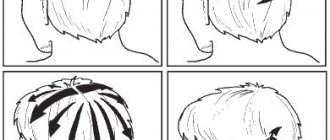Modern people are subject to a colossal load on the visual system. After all, modern technologies have filled almost all areas of professional activity. Also, every person has a computer or TV at home, the use of which negatively affects visual acuity and eye condition. What is evidenced by the malaise when the eyes hurt, as if they are pressing. The causes and methods of eliminating such pain should be considered in more detail.
- Causes of dark circles under the eyes in women, how to get rid of them
- Find out what to do if your eyes hurt from the computer
- Getting rid of eye pain after welding - quickly and easily
- Why bags appear under the eyes and how to get rid of them
- Why do your eyes hurt when you have a cold?
Dizzy and dark vision: causes of the disease
With the regular occurrence of dizziness, accompanied by darkening of the eyes, it is important to determine which factor, physiological or pathological, causes these unpleasant sensations. To do this, it is necessary to identify in which cases such symptoms appear.
“Safe” reasons
There are many factors that can cause a person to feel dizzy and have dark vision. Some of them are not associated with pathologies, so to normalize well-being, it is enough to eliminate their effects. Reasons that cause short-term dizziness and darkening of the eyes include:
- dehydration – not enough water in the daily diet can lead to the symptoms described;
- emotional overstrain, past stress - strong excitement, fright and a feeling of fear contribute to the release of adrenaline, due to which the blood vessels narrow and the brain does not receive enough oxygen;
- advanced age - after 60 years, the functionality of the hematopoietic system and vestibular apparatus decreases, which leads to dizziness with darkening of the eyes at the slightest physical exertion;
- taking medications – unpleasant symptoms occur as a side effect or individual intolerance;
- weak vestibular apparatus - the effect of “motion sickness” occurs when traveling on any type of transport, riding on a swing, climbing to a height, looking at objects in the form of a swinging pendulum;
- intense physical activity - hard physical labor, preparation for sports competitions;
- pregnancy, menopause or menstrual cycle - symptoms arise at the time of hormonal changes in the body;
- strict diets - in particular, restriction in the diet of foods rich in carbohydrates;
- Alcohol abuse – darkening of the eyes with severe dizziness is a constant symptom of alcohol intoxication.
The impact of the described factors does not lead to the development of pathologies, but creates significant discomfort and the risk that a person may be injured at the moment of dizziness and darkening of the eyes.
If the cause is a disease
Structure of the inner ear
If your vision gets dark and you feel dizzy, then this can be caused not only by the “harmless” reasons described above, but also by serious diseases affecting the main vital systems. These include:
- orthostatic hypotension - a sudden decrease in blood pressure, as a result of which the brain tissue experiences oxygen deficiency;
- vegetative-vascular dystonia is a complex of disorders of the autonomic and nervous system, due to which there is a malfunction in the functioning of all vital systems;
- anemia – lack of iron (red cells in the blood structure);
- hypoglycemia – a deficiency of glucose in the blood, which causes the brain to lack nutrition;
- endocrine disorders, in particular hypothyroidism;
- migraine;
- atherosclerosis – unpleasant symptoms arise due to poor blood circulation in areas of narrowing of blood vessels;
- otitis media, occurring in acute and chronic forms;
- Meniere's disease, which develops in the structures of the inner ear;
- intracranial tumors and hematomas resulting from trauma;
- cervical osteochondrosis and other diseases affecting the cervical vertebrae;
- vision disorders - glaucoma, retinal damage;
- temporal arteritis;
- stroke.
Each disease described is characterized by additional symptoms, the presence of which the doctor takes into account when making a diagnosis.
Main symptoms
In some cases, dizziness does not cause serious consequences. The natural state occurs when traveling in a car or in extreme situations. The vestibular system temporarily goes out of order, which is a normal process. If dizziness occurs with the slightest movements, you should conduct an examination for pathologies in the body.
• The vision becomes dark and fog appears.
• Blood pressure drops.
Spasms form in the blood vessels of the brain; the brain makes it difficult to deliver oxygen and nutrients necessary for the normal functioning of the body as a whole. Dizziness lasts for 2-3 seconds or more. Heightened sensations are formed during sudden movement and a state of rest. The provocateur of an uncomfortable state is stress, tension or excitement - with small releases of adrenaline into the blood, the blood vessels become smaller, slowing down dizziness.
What to do if you experience symptoms of dizziness and darkening of the eyes
If you often experience symptoms such as: “dizzy”, “darkening in the eyes”, then consultation with a doctor is mandatory, because these unpleasant sensations can signal hidden pathologies that need to be treated urgently. To determine the reason why your head is spinning and your vision is getting dark, you may need a comprehensive examination, which includes the following diagnostic techniques:
- blood pressure measurement;
- assessment of the condition of blood vessels using encephalography;
- ultrasound examination of the blood vessels of the brain and cervical spine;
- examination of brain structures using MRI to detect tissue damage and the development of acute inflammatory processes;
- conducting a CT scan to detect degenerative changes in the cervical vertebrae and the presence of tumor-like processes occurring in the brain tissue;
- examination of the condition of the fundus and oculomotor nerves;
- eye pressure measurement;
- optical coherence tomography – to assess the condition of the retina and optic nerves;
- blood tests (biochemical, clinical) - to determine the level of glucose, cholesterol, hemoglobin, thyroid and sex hormones;
- bacteriological culture and blood sampling to identify infections and viruses that provoke severe inflammation of the brain;
- neurological tests - if vegetative-vascular dystonia and other neurological disorders are suspected.
People who regularly experience dizziness with blackouts should be able to help themselves to avoid injury and loss of consciousness. To do this, depending on the reason that caused the discomfort, at the time of the attack you should perform the following actions:
Floaters in the eyes with VSD
Vegetative-vascular dystonia affects the functioning of various organs. The variety of symptoms makes diagnosis difficult. Eye floaters are one such controversial phenomenon. This sign can be as simple as blurred vision from fatigue, it can indicate the development of pathology of the visual system or signal a disorder such as VSD.
The role of the autonomic nervous system
The autonomic nervous system is responsible for regulating the functioning of all organs. Salivation and changes in pupil size, increased body temperature and the production of digestive juices, acceleration and deceleration of the heart, changes in blood pressure - this is not a complete list of regulatory functions performed by different parts of the spinal cord. The signal from it reaches the organ through nerve endings automatically, bypassing the brain. The system consists of two sections that have the opposite effect: sympathetic (responsible for activating an organ or process) and parasympathetic (responsible for inhibiting the process, slowing it down). When the nerve connection between the spinal cord and one or another part of the body is disrupted, VSD occurs. Moreover, the organ itself does not have any pathological changes.
Symptoms of VSD
VSD has a wide range of symptoms. This is due to the complex effect of the autonomic nervous system on the entire body. It is in the system where there is a loss of balance between the spinal cord and the organ that the disorder occurs. The patient undergoes a large number of examinations, trying to find the cause of the ailment. During the study, it turns out that the seemingly affected organ is healthy, and the person feels symptoms of vegetative-vascular dysfunction. After its correction, all painful sensations disappear. However, if the manifestations of dystonia are not paid attention to, its symptoms can provoke a dangerous disease. Symptoms of VSD include:
- An increase or decrease in blood pressure, which is accompanied by visual disturbances in the form of spots before the eyes or a veil.
- Pain in the heart area, irregular heartbeat.
- Difficulty breathing, lack of air, yawning.
- Drowsiness or, conversely, sleep disorders.
- Abdominal pain, digestive system disorder.
- Frequent urination, menstrual irregularities (in women), the appearance of prostatitis (in men).
- Chills, numbness and coldness in the extremities or, conversely, a flush of heat to the face, sweating.
- Disturbances in the psycho-emotional sphere, a state of apathy.
Floaters before the eyes with VSD
Patients describe floaters in front of their eyes as white dots, sometimes with a black rim, flickering ribbons or bright spots. A person sees all these objects due to the fact that they do not transmit light. Floaters can be a sign of various diseases: retinal detachment, destruction of the vitreous body, anemia, brain tumor, VSD, bleeding inside the eye, infectious diseases. In addition, floaters and blurred vision may appear during pregnancy or be the result of taking certain medications.
Floaters as a symptom of VSD
With vegetative-vascular dysfunction, the patient's blood pressure can sharply increase or decrease. In both cases, cerebral blood flow is disrupted. The blood vessels of the eyes also experience a lack of oxygen. Retinal ischemia begins, and the patient sees spots or flying spots before the eyes. The condition is accompanied by dizziness, especially with a sudden change in body position.
Diagnosis of the disease
To exclude the presence of dangerous eye diseases, the symptom of which can also be floaters, the patient should contact an ophthalmologist for examination. The doctor examines the patient's fundus and performs ophthalmoscopy. If the cause of the deviation is not in the visual analyzer, the patient is referred to a therapist and neurologist for further examination and an accurate diagnosis.
Treatment of the disease
If the appearance of visual deviations is caused by vegetative-vascular dystonia, it is necessary to normalize the pressure. The doctor prescribes the drug and its dosage. Self-medication can harm the patient's health
You should pay attention to your daily routine. Allocate more time for sleep and rest, balance the menu
A consultation with a psychotherapist is also recommended to correct the patient’s psycho-emotional sphere.
Floaters before the eyes are one of the signs of VSD. Occurs when pressure increases or decreases. The phenomenon may also be a symptom of other dangerous eye diseases. To identify the causes of the appearance of floaters, consultation with an ophthalmologist, therapist and neurologist is necessary. With VSD, positive results are achieved by correcting the daily routine and normalizing nutrition.
How to treat
Dizziness and darkening of the eyes are symptoms, so to eliminate them, you need to treat the disease whose development they signal. In most cases, it is enough to adjust the diet, daily routine and limit exposure to factors that provoke this condition for the symptoms to disappear. However, in the presence of serious disorders and inflammatory processes, accompanied by darkening of the eyes and dizziness, drug therapy cannot be avoided. In such cases, the patient is prescribed medications from the following groups:
- Anti-inflammatory drugs and antibiotics - for acute otitis media, labyrinthitis, and infectious diseases of the brain.
- Nootropic and sedatives, drugs that normalize blood flow, antidepressants - for vegetative-vascular dystonia, changes in blood pressure, stress and depression.
- Muscle relaxants, chondroprotectors, physiotherapy, massage sessions - for osteochondrosis and other pathologies of the cervical spine.
- B vitamins, calcium channel blockers, as well as drugs that provide brain nutrition - for brain hypoxia, mental fatigue.
- Iron-containing medications – for diagnosed anemia.
- Hormonal drugs - prescribed in cases of hormonal imbalance in the reproductive or endocrine system.
Feel free to ask your questions right here on the website. Write >>
The duration, regimen and dosage of medications should be determined by the doctor, based on the results of the diagnostic study and the patient’s condition.
The information on the site is created for those who need a qualified specialist, without disturbing the usual rhythm of their own lives.
Many people know firsthand a condition in which the vision suddenly becomes dark and dizziness occurs. It can be difficult to immediately determine the cause of this phenomenon. Therefore, if these signs appear, you should consult with a general practitioner, and if necessary, he will refer the patient to a highly specialized specialist, for example, a neurologist or cardiologist.
For some, the duration of such an attack does not exceed a few seconds and is explained by ordinary fatigue. For others, such a reaction of the body indicates severe disturbances in its functioning.
Puts pressure on the eyes from the inside - treatment
Therapy of pressure sensations is a long and labor-intensive process and consists of treating the underlying pathology.
For this purpose it is prescribed:
- Use of medications.
- Carrying out therapeutic exercises.
- The use of alternative medicine.
Treatment with drugs
Eye drops will help minimize unpleasant symptoms:
- Azopta. Helps reduce pressure in the eyes.
- Trusopta. Helps in the treatment of glaucoma, reducing pressure in the eyes, eliminating unpleasant symptoms, and improving the production of intraocular fluid.
- Travatana. The drug helps stabilize pressure in the eyes.
- Betoptika. Helps minimize pressing pain.
- Timolol. Combats the symptoms of glaucoma.
Photos of medicines:
Azopt
Trusopt
Travatan
Betoptik
Timolol
The following drugs are also prescribed as part of complex therapy
| From the group | Prescribed use: |
| Painkillers | Analgina Pentalgina |
| NSAIDs | Ibuprofen Nurofen Diclofenac |
| Diuretic medicines | Diacarba Furosemide |
| Drugs with antibacterial properties | Cephalexin Erythromycin Amoxicillin |
| Sedative medications | Valerian Phytoseda Novopassita |
Exercise for the eyes
The minimization of pressing sensations is facilitated by therapeutic exercises. It will help strengthen the eye muscles and combat tension.
Charging should be carried out in a sitting position , and at the same time move only your eyes:
- You need to make 10 up and down movements, first opening your eyes, then closing them. Performed in three approaches .
- Alternately raising and lowering open eyes ( six times ). Repeated twice.
- Mentally drawing wavy lines with your eyes in the direction from yourself, towards yourself, to the right, to the left. You need to do 7 movements .
- You need to draw horizontal and vertical figure eights, first with your eyes open and then closed ( seven times ).
- With your eyes you need to draw a circle in the right corner of the room, then a circle in the middle of the room, and then a triangle.
Useful video:
Alternative medicine therapy
Compositions made from natural ingredients will be an excellent addition to traditional therapy and will help normalize well-being and eliminate oppressive, uncomfortable sensations:
- If there is pressure on the eyes from the inside, you can try to relieve the symptom using compresses . You need to mix chamomile flowers with nettle and lily of the valley in equal proportions. 20 g of the mixture is steamed with boiling water - half a liter . The product is boiled over low heat, cooled, and filtered. Moisten gauze wipes in the resulting composition and apply them to the eyes for five minutes .
- Tea will help minimize cephalalgia and pressing sensations in the eyes. You need to steam lemon balm herb - 10 g with boiling water - 300 ml. It is recommended to drink 50 ml. two to three times a day .
- You need to mix red wine - 200 ml. with honey – 50 g and aloe juice – 15 ml. The drug is taken three times a day, 10 ml.
Why do my eyes get dark and my head feel dizzy?
These symptoms often occur as a result of natural physiological processes that occur in the body. Reasons that do not pose a serious danger include the following:
- Increased concentration of adrenaline in the blood. This happens when a person finds himself in a stressful situation, gets overexcited, or experiences severe psycho-emotional shock.
- Long stay at altitude.
- Following strict diets, as a result of which the body is exposed to an acute lack of glucose.
- Taking certain medications - tranquilizers, antibacterial drugs, antiseptics.
- Sports training during which you have to sharply turn your head or torso.
In the above situations, in order to eliminate unpleasant symptoms, you need to get rid of the provoking factor. For example, calm down, stop drug therapy with specific medications, and start eating right. If, following these recommendations, improvements do not occur within a week, you should visit a doctor. The doctor will be able to identify the causes of this condition and, if necessary, prescribe appropriate treatment.
In what cases should you sound the alarm?
Its mild form is characterized by symptoms that resemble a fainting state. Dizziness, blurred vision, nausea occur, and the person is afraid of losing consciousness. Sometimes sweating increases, and a feeling of constriction appears in the epigastric region. The attack usually lasts no longer than five minutes.
With disorders of high severity, psychosensory disturbances appear. The severity of the above clinical manifestations increases significantly. Low blood pressure can cause fainting. This attack lasts approximately 20 seconds.
There are some diseases that are characterized by similar symptoms. Among them:
- Vegetovascular dystonia. With this disease, the patient feels dizzy and has a severe headache. The location of the pain syndrome in most cases is the temporal and occipital region.
- Cervical osteochondrosis. The disease is characterized by the appearance of the above-described symptoms in the morning and evening. The head begins to feel more dizzy when it is turned, as well as when a person bends over or suddenly changes body position.
- Migraine. In addition to severe headaches, the condition is accompanied by dizziness, tinnitus, photosensitivity, nausea and other symptoms.
- Diseases of the inner ear, which are caused by dysfunction of the vestibular apparatus.
- Inflammation of the inner ear. For example, otitis media, in which the ears become blocked, the ears hurt and the head feels dizzy, especially when changing position.
- Traumatic brain injuries.
- Trinitarian neuralgia. A signal of the development of such a disease is clouding in the eyes. In this case, therapy must be started as quickly as possible, otherwise adverse consequences may develop. Treatment in most cases comes down to the use of antibiotics.
- Oncology of varying severity. With such a disease, a person experiences the symptoms in question almost every day.
Orthostatic hypotension
The manifestation of the disease is inevitable if somatic and neurological disorders occur. The main symptom is a sharp decrease in blood pressure. Characteristic indicators are observed when the patient’s body position changes. With a mild degree of the disease, a pre-fainting state occurs at the moment of assuming a vertical position.
Severe dizziness is accompanied by a feeling of nausea, weakness, increased sweating, blurred vision, and compression under the xiphoid process. There is a pallor of the skin and a waxy sheen. The attack lasts about 5 minutes.
With complications of orthostatic hypotension, psychosensory disturbances appear. The above symptoms are protracted. The duration of the attack is 20 seconds.
Semi-fainting is often caused by pathology of the central nervous system or cardiovascular system. There may be a disturbance in cardiac output, heart rhythm, preventing the normal flow of blood to the brain. Dilatation of peripheral vessels with low blood supply is considered.
The occurrence of orthostatic hypotension in pathologies of the autonomic nervous system is caused by a number of disorders:
• Failures in the return of venous blood to the cardiac system.
• Decrease in compensatory functions of the vascular system.
• Failures in the redistribution of blood supply.
An additional mechanism is the reflex acceleration of heart rhythms in response to changes in position.
Dizziness and blurred vision are signs of a stroke
Sudden dizziness and blurred vision may indicate the development of a stroke, since these are the symptoms observed in the first stage. In this case, you cannot waste a second - you must immediately call an ambulance.
In addition to the above clinical manifestations, the following signs may indicate a stroke:
- squinting eyes;
- speech problems;
- facial asymmetry.
Even if at least one of these symptoms occurs, this may already indicate a stroke. The headache does not always hurt. If such attacks appear regularly, circulatory disorders in the brain can be suspected. If you leave this problem unattended and do not take appropriate measures, the consequences can be very sad. In severe cases, a stroke leads to paresis and paralysis, as a result of which a person may remain disabled for life.
White spots and spots
Those who have transparent spots floating before their eyes should be wary, as this may be a symptom of some serious illness. Most often, spots of white and transparent color are formed when a disease or inflammatory process appears in any structures of the organs of vision; such spots can appear immediately before the development of such an insidious disease as cataracts.
White spots floating before the eyes can also form due to clouding of the cornea, and they may indicate the presence of leukoma, and if left untreated, it can lead to complete blindness. In addition, white spots can form for other reasons, for example, due to prolonged contact with toxic vapors or gases, as well as due to mechanical trauma to the eyes.
Various infectious diseases, such as syphilis, can provoke the appearance of white spots before the eyes. White spots that float before the eyes can also appear due to the fact that the body does not receive enough nutrients, and if left untreated, this pathology can lead to thinning and weakening of the retina, as well as to its rupture.

What to do?
When a person nearby experiences symptoms such as darkening of the eyes and dizziness, it is imperative to provide him with first aid. The best thing to do in this case is to call a team of medical workers, and then carry out the following manipulations:
- If this happens indoors, open the window slightly to allow sufficient oxygen to flow in.
- The victim must be laid down very carefully and the clothes that are squeezing his body must be unbuttoned.
- Try to calm down.
- The patient's legs should be slightly elevated. This will allow blood to flow better to the brain.
Some people who find themselves in similar situations know what caused this condition and can tell you what needs to be done. Thus, a person suffering from diabetes will explain that he did not eat on time. You can help him by giving him sweetened water to drink. Then measure your blood sugar levels using a special device - a glucometer.
What are you not allowed to do? If a person develops a severe headache, dizziness, or blurry vision, do not leave him alone. A sharp deterioration in the patient's condition may occur, which can even lead to death. In addition, experts do not advise trying to help the victim with the help of available medications. Based on such clinical manifestations, it is not always possible to accurately determine the cause of the condition. Self-medication in some cases only leads to blurring of symptoms, which is why even a doctor will not immediately be able to understand what happened to the patient. In addition, some medications can cause allergies, anaphylactic shock, and other side effects.
How to Know If You're About to Pass Out When You're Dizziness
The most common consequence of dizziness or so-called vertigo is fainting. This manifests itself as a lack of coordination in space, which can cause a person to fall sharply. At the moment of the fall, blackout occurs in the eyes and a sudden loss of consciousness for a short period of time (usually a matter of seconds).
The condition when the victim faints is accompanied by additional symptoms. These include a feeling of objects spinning around you, gagging, dark spots before the eyes, tremors and numbness of the limbs, tinnitus, increasing weakness, muscle spasms, tachycardia, dizziness, nausea, fainting and others.
There are several types of fainting:
- vasomotor attack;
- nicturic attack;
- hypoglycemic attack;
- hyperventilation attack.
Nocturic nocturnal fainting attack is typical for people suffering from problems with the prostate gland. For example, a man with existing problems may faint after urinating. An epileptic attack occurs due to organic disorders, the provoking factors being the use of alcohol and drugs.
Vasodepressor dizziness and fainting are diagnosed more often against the background of stressful situations: fear of something, stuffiness in the room, feeling pain or anticipation of it, etc.
https://www.youtube.com/watch?v=59XXLlwaSXw
A hyperventilation attack causes visual disturbances (flashes of light in the eyes or the appearance of “floaters”), nausea and even vomiting are possible.
Diagnostic methods
A patient who consults a doctor with complaints of constant dizziness and blurred vision may be prescribed several diagnostic procedures. The fact is that such symptoms often indicate hidden diseases that need to be treated urgently. To determine the cause of the condition, a comprehensive examination may be required, including the following measures:
- Pressure measurements.
- Ultrasound examination of the cervical spine and cerebral vessels.
- Magnetic resonance imaging to detect damage to brain tissue and the development of acute inflammation.
- Encephalography to assess the condition of blood vessels.
- Computed tomography to detect changes in the cervical vertebrae and the development of cancerous tumors.
- Fundus examination and eye pressure measurements.
- General blood test and biochemistry - to determine the content of blood sugar, cholesterol, hormones, hemoglobin.
- Culture and blood sampling to detect infectious and viral diseases that can cause dangerous inflammation of the brain.
- Neurological tests - if the development of vegetative-vascular dystonia and other neurological disorders is suspected.
Diseases of the visual apparatus
During the initial consultation with complaints of bursting eye pain, the ophthalmologist tries to detect diseases according to his profile. Such symptoms occur in many eye pathologies, but among the most common diagnoses, the following listed causes lead.
Intraocular hypertension
With this disease, patients complain of aching in one or both eyes; it seems to them that the eyeball is bursting. Often all this is accompanied by complaints of headache. There are cases when intraocular hypertension is asymptomatic and is detected only after measuring intracranial pressure.
Hypertension can be essential or symptomatic. Essential affects people over 35 years of age. Symptomatic can occur as a result of intoxication with chemicals or as a side effect after certain medications; it often occurs against the background of existing vision pathology.
Intraocular hypertension, like glaucoma, is characterized by an increase in intracranial pressure with the difference that the optic nerve is not affected. However, it is dangerous because it can develop into secondary glaucoma with its inherent symptoms.
Mechanical damage to the eye
Minor types of injuries, such as shallow penetration of foreign bodies, are not dangerous. If you apply in a timely manner, everything will go away within a week. A much greater threat to the eyes is posed by moderate mechanical damage caused by a blunt or sharp object.
In this case, the conjunctiva, eyeball, and eyelid may be injured, as well as the lens, retina, and iris. Why is this dangerous? With mechanical trauma, internal hemorrhages are possible, and in addition, infection of the injured tissues. A timely visit to a doctor will allow you to accurately determine all the damage and also save the patient from complications. The sooner measures are taken, the greater the chances of a quick recovery!
Swelling of the eyes or swelling of the eyelids with pain
When an ophthalmologist is contacted with a complaint that the eyes are swollen, they mean that the eyelids are inflamed and swollen. This happens for many reasons. According to certain characteristics, three are distinguished:
- Allergic edema. They appear violently, suddenly, and mostly the upper eyelids swell, but without pain. To eliminate it, it is necessary to identify the allergen that caused the swelling. Antihistamines are prescribed as therapy.
- Inflammatory swelling. They are distinguished by redness of the eyelid, when you touch it, you feel an increased temperature, and when you press it, pain is possible. They occur with infectious eye diseases; it is in these cases that the eyes hurt, as if they are being pressed.
- Non-inflammatory swelling. They are symptoms of heart and kidney diseases. In these cases, the eyelids swell in the morning, and the swelling disappears during the day.
Eye inflammation: conjunctivitis
The disease is easily treatable and its symptoms disappear within two weeks. If a patient with conjunctivitis suffers from severe eye pain or photophobia, treatment takes longer.
Conjunctivitis can be infectious, allergic, or occur due to injury. The greatest danger is the so-called neonatal conjunctivitis, which affects newborns. Infection is possible when passing through the birth canal if the woman in labor is sick with chlamydia or gonorrhea.
Treatment
To get rid of dizziness and blurred vision, you should know the cause, since it is the underlying disease that needs to be treated.

It is often enough to make adjustments to your diet, establish a daily routine, and eliminate the influence of factors that cause this condition for the symptoms to go away. But if there are dangerous disorders and inflammations, drug therapy will be required. In this situation, the patient may be prescribed the following medications:
- Anti-inflammatory and antibacterial drugs - for acute otitis media, as well as infections that affect the brain.
- Calming medications, antidepressants, as well as medications that normalize blood flow - for vegetative-vascular dystonia, pressure surges, stress and depressive conditions.
- B vitamins, calcium antagonists, agents that provide nutrition to the brain - during intellectual overload, hypoxia.
- Physiotherapeutic procedures, massage, medications that normalize tone - for osteochondrosis and other diseases of the cervical vertebrae.
- Preparations containing iron - for low hemoglobin.
- Hormonal drugs – for hormonal imbalances or disruptions in the endocrine system.
The duration, dose and regimen of therapy are determined by the doctor, taking into account the data obtained during the examinations.
Clinical picture
The situation when a person experiences dizziness, accompanied by darkening of the eyes, often occurs:
- For vascular disorders or other abnormalities related to the brain.
- If there are problems with the organ of vision.
In addition, it is important to determine the shape of the turbidity. This will help determine the cause of its occurrence. It could be:
- permanent;
- periodic;
- partial.
Based on these indicators, the doctor will be able to make a preliminary diagnosis, as well as judge what caused the frequent dizziness, accompanied by darkening of the eyes.
Factors that provoke the appearance of such anomalies may include:
- Hypotension. In this case, the person’s performance decreases, their hands begin to tremble, dizziness and glare appear before the eyes. You may experience pain in the back of the head or frontal lobes (it all depends on the individual characteristics of the body). As soon as the necessary manipulations are carried out to eliminate the problem, the patient’s well-being returns to normal.
- Frequent and severe stress, nervous or emotional overstrain.
- Anemia, in which there is not enough hemoglobin in a person’s blood. Because of this, he experiences dizziness, weakness, darkening of the eyes, and shortness of breath even with light physical exertion.
- Increased blood pressure, accompanied by spots before the eyes, pounding in the temples, stuffy ears, headaches, and dizziness. Nausea often occurs, sometimes with bouts of vomiting.
- Neurocirculatory dystonia, that is, a violation of the full regulation of vascular tone.
- Pregnancy period.
- Gestosis, or late toxicosis. In this case, the woman experiences swelling of the face, legs, arms, surges in blood pressure, and migraines. Sometimes a pregnant woman may not only suffer from dizziness and blurred vision, but also from fainting. This condition is extremely dangerous both for the health and life of the woman and for her child.
But the list of possible pathologies does not end there. Other pathologies that can cause darkening of the eyes and dizziness are:
- Myopia. If a person cannot clearly see things located at a certain distance from him, squints and strains his eyes, then this may be a clear sign of myopia. In this case, a consultation with an ophthalmologist is required, since the disease poses a serious threat to vision.
- Astigmatism, when blurred vision is observed in a person, regardless of how far he is from objects or people. This pathology is caused by the acquisition of an irregularly shaped cornea.
- Farsightedness. If, when looking closely at objects, a person experiences a blurred image, he has to squint his eyes, which causes a headache or slight dizziness, then we are talking about this disease.
- Presbyopia. This pathology usually occurs in people over 40 years of age, when the lens loses its elasticity. The pathology may be accompanied by pain and blurred vision when looking at small print or various objects at close range.
- Cataracts, in which there is blurred vision, glare or white halos on light sources. Due to decreased visual acuity, the patient may experience periodic dizziness.
- Glaucoma.
- Chronic dry eye syndrome. The main symptom is sudden blurred vision. Sometimes such a sign of the disease may be present in the patient on an ongoing basis.
- Migraine. If a person is often bothered by severe headaches, accompanied by bright flashes of light, dizziness, blurred vision and weakness, then this indicates a migraine attack.
The situation can be extremely dangerous, so it is impossible to ignore the alarming symptoms.
Prevention
It is much easier to prevent any disease than to cure it later. If your head is spinning and your vision becomes dark as a result of physiological changes in the functioning of the body, you should try to adjust your lifestyle. To do this, experts advise getting more rest, not disrupting your work and rest schedule, eating a balanced diet, and avoiding stressful situations.
If the causes are physiological disorders, preventive measures will consist of the same. They just need to be supplemented with the therapy prescribed by the doctor.
Reasons that require attention
If the question in question (“My eyes are foggy, I’m dizzy, I can barely stand on my feet…”) arises frequently, it cannot be ignored. The causes of severe dizziness, which causes darkness in the eyes, may be more serious:
- Medicines.
- Hypertension.
- Hypotension.
- Dehydration (floating in the eyes).
- Pre-syncope (“tingling in the ears”, cloudiness in the eyes, pallor).
- A tumor compressing the optic nerve.
- Eye damage.
- Brain damage.
- Intoxication (particularly carbon monoxide). Carbon monoxide is formed during incomplete combustion and is not felt. Poisoning can occur due to insufficient sealing of the boiler or stove. The following are signs of poisoning with this substance:
- nausea;
- vomit;
- headache;
- euphoria;
- noise, ringing in the ears;
- hearing disorders;
- loss of consciousness.
Video: what to do if you feel dizzy

There is no danger if such an unpleasant symptom as dizziness appears as a result of motion sickness on the road or after a carousel: this is a completely natural condition, and it passes quickly. It's just that your vestibular system has suffered a temporary malfunction. But when your vision often gets dark and you feel dizzy, especially for several hours at a time, it means that your body is not in order and is asking for help. What to do if you feel dizzy and your ears may be blocked? In this case, you need to urgently contact a therapist, and he will refer you to specialists. But in no case should you diagnose yourself, self-medicate, or completely give up on the problem.
Which doctor should you consult if there is pressure on the eyes from the inside?
When your eyes are very sore, there is a feeling of squeezing, and your overall health is deteriorating - you need to visit an ophthalmologist.
Discomfort in the right or left eye, together with pressure, can signal not only eye pathologies, but also diseases of the heart, central nervous system, and brain.
To accurately diagnose the feeling of pressure on the eyes from the inside, you need to seek help from specialized specialists:
- To the therapist.
- Cardiologist.
- Endocrinologist.
- Neuropathologist.
- Otolaryngologist.
In what cases is it necessary to urgently see a specialist?
If the pressing sensations are rare and not complicated by other unpleasant manifestations, then rest or the use of a painkiller will be enough . It’s another matter when there is often pressure on the eyes from the inside, the head is heavy, it hurts to look at the light. Do not delay visiting a doctor in the following cases:
- The pain is accompanied by a significant increase in temperature.
- The feeling of pressure is complicated by severe pain in the eyes.
- Discomfort, feeling that the eyes are being squeezed out.
- The pain does not go away after taking painkillers.
Pain and discomfort in the eyes, along with cephalgia, can be symptoms of diseases that require hospital treatment: meningitis, malignant neoplasm, stroke.
Signs of vertigo syndrome
Dizziness is divided into systemic (vestibular) and non-systemic. Systemic vertigo refers to the illusory rotation of objects around the patient or the patient around objects, a change in the position of the body in space - falling, as if into an abyss, or taking off. Associated signs that darkening of the eyes and dizziness have appeared are loss of balance, stuffy ears or one ear, nausea. This type of dizziness indicates that some parts of the central nervous system or ears are affected.
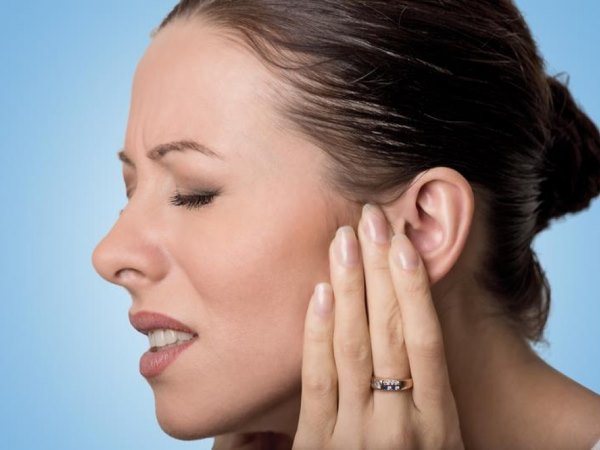
Non-systemic dizziness includes sensations of rotation inside the head. Symptoms include staggering while walking (“drunken gait”), weakness, double contours of objects, darkness in the eyes when standing up suddenly, and a feeling of a veil. The cause of this condition may be a dysfunction of the brain. In this case, attacks can last seconds or even several days.
When to call an ambulance
A pre-fainting state risks developing into fainting. This means that you can lose consciousness and fall - and it’s good if you land on something soft and don’t get a concussion.
In addition, if circulation is severely and permanently impaired, brain tissue may begin to die. This is deadly.
If someone near you loses consciousness and does not come to within a minute of Fainting, immediately dial 103 or 112.
An ambulance should also be called if the darkening in the eyes does not go away within a few minutes.
Causes
There are many reasons for this symptom. The most common of them:
- Weakness caused by general illnesses with fever.
- Abrupt changes in blood pressure.
- Depression.
- Cervical osteochondrosis.
- Dieting. As a result, a lack of glucose occurs in the body.
- Vascular spasms. An increase in adrenaline when suddenly standing up from a lying position, sitting, or with a surge of emotions. At the same time, the blood vessels narrow and the blood supply to the brain slows down.
- Being on top.
- Taking medications such as antibiotics, tranquilizers.
What diseases can cause dizziness?
Suddenly your vision darkens and you feel dizzy? This could be a signal of some disease.
Vegetovascular dystonia
In addition to dizziness, severe headaches may appear in the temples and back of the head. In this case, the pressure changes abruptly.
Cervical osteochondrosis
If you feel dizzy and your ears are blocked, then the source of these sensations may be problems with the spine, namely with its cervical region. Cervical osteochondrosis is a very likely cause of the appearance of such neurological symptoms. A sedentary lifestyle, incorrect posture when sitting at a computer for a long time, sedentary work - all this significantly and most negatively affects the condition of the spine. Nausea, darkening of the eyes, and dizziness will occur when turning, bending, or in any case when there is a sudden change in body position.
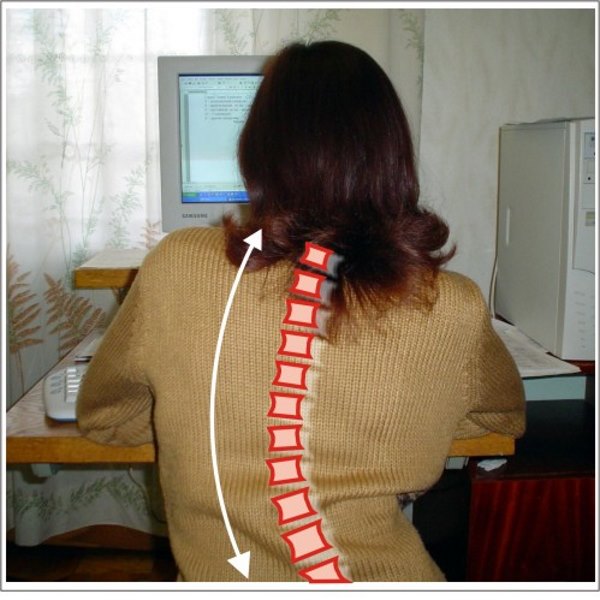
Migraine
It is accompanied by dizziness, headache, tinnitus, and nausea.
Inner ear diseases
For example, an accumulation of calcium crystals in the cochlea or nerve damage. Nausea appears, darkening in the eyes, blood pressure increases. With Meniere's syndrome - inflammation - one ear is usually affected, and dizziness is added to the severe pain.
Skull injuries
Open and closed fractures. Concussion, bruises.
Acute sinusitis
This is another “fertile ground” for dizziness, stuffy ears and darkening of the eyes. Acute sinusitis - swelling and inflammation of the paranasal sinuses, a blocked nasal passage, or both are narrowed. Therefore, breathing is difficult, and less oxygen enters the body, including the brain. As a result, headaches and dizziness occur.
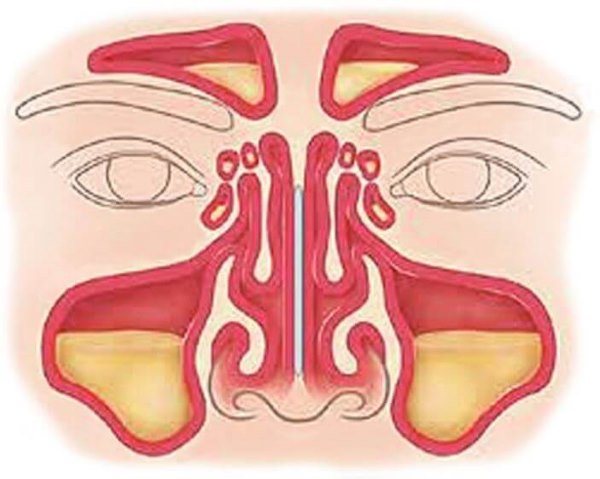
Treatment recommendations
Only establishing an accurate diagnosis makes successful treatment possible. Any cause of dizziness with blackout requires specific treatment:
- blockage of cerebral vessels and problems with blood circulation - a course is being conducted to restore blood vessels;
- clouding of the vitreous - absorbable agents are used;
- infectious diseases - anti-inflammatory drugs;
- lesions of parts of the nervous system - leptids and magnetic stimulation.
The treatment regimen depends on the detected disease, which is accompanied by dizziness and darkness in the eyes. For example, anemia is easily corrected with vitamin complexes. VSD - medications to improve cerebral circulation and sedatives. And cervical osteochondrosis is cured by anti-inflammatory therapy.
The following procedures have proven themselves to be excellent:
- magnetotherapy,
- balneotherapy,
- massage,
- mud therapy,
- reflexology.
Very often after these measures the condition improves significantly.
When asked why vision darkens and dizziness, there is no definite answer. It should be realized that the pathologies that cause such unpleasant conditions are very different. If you feel dizzy or have dark vision, immediately contact a therapist and get examined. Once the cause is discovered, begin appropriate treatment immediately.
In what cases should you immediately contact specialists:
- If after dizziness the temperature rises.
- If pain begins in the muscle tissues of the arms and legs.
- For severe headaches.
- For prolonged attacks of dizziness.
- When blood or pus comes out of the ear.
When visiting, the doctor diagnoses:
- Audiography is done.
- An examination of the eyeball and optic nerves is carried out using a computer.
- Nuclear magnetic resonance and CT scan of the brain are being studied.
- Magnetic resonance imaging.
- Doppleography using ultrasound. Most often, the main arteries in the brain are examined.
- X-ray of the cervical spine and skull.
Treatment of dizziness with medication
After identifying the causes of the disease, the specialist prescribes medication:
- If your head is dizzy due to hypertension, then the patient should take a course of sedatives or blood pressure lowering drugs.
- For vestibular vertigo, the specialist recommends taking Cinnarizine or Scopolamine.
- Under no circumstances should you take medications without a doctor’s prescription and determine the dosage yourself.
- If your head is dizzy due to neurological problems, the following medications are prescribed:
- Betaserc 8 mg 3 times a day.
- Betahistine dosage is the same as the previous drug.
- Diphenhydramine 50 or 100 mg.
- Motilium for vomiting and nausea.
Folk remedies for treating dizziness
- Infusion of ginkgo biloba helps well. It is done like this: take a tablespoon of biloba leaves and pour a glass of boiling water, then put the mixture in a water bath and cook for 15 minutes. Afterwards, the infusion should be left for half an hour, then it is filtered. The course is 2 weeks, 1/3 cup of tincture 3 times a day.
- You can make tea from ginger. Hot water is poured into a thermos and a pinch of tea leaves is placed. The ginger is peeled and thinly sliced into slices and also placed in a thermos. Everything is mixed and infused for 30 minutes. You can drink tea 3 times a day.
- Freshly squeezed beet or carrot juice helps. This recipe was used back in the Middle Ages. But it is better to drink this juice on an empty stomach.
- For frequent dizziness, use pomegranate juice, especially it helps those people who have low hemoglobin.
- Tea is made from parsley seeds. First you need to grind them, and then brew 1 teaspoon with a glass of boiling water and leave for 8 hours. It must be consumed in small portions throughout the day.
- Linden, mint or lemon balm tea will help relieve attacks of dizziness.
- An infusion of clover inflorescences will help well. You need to take 1 tablespoon and pour a glass of boiled hot water.
- You can add seaweed powder to your food. It is sold in pharmacies. It will help stop attacks and saturate the body with phosphorus and iodine.
Examination methods
The purpose of the examination is to identify the causes of this condition. The most valuable methods in terms of information are:
- ophthalmoscopy;
- magnetic resonance examination;
- optical tomography of the eye;
- Ultrasound of the vessels of the neck and brain;
- analysis of illusory sensations.
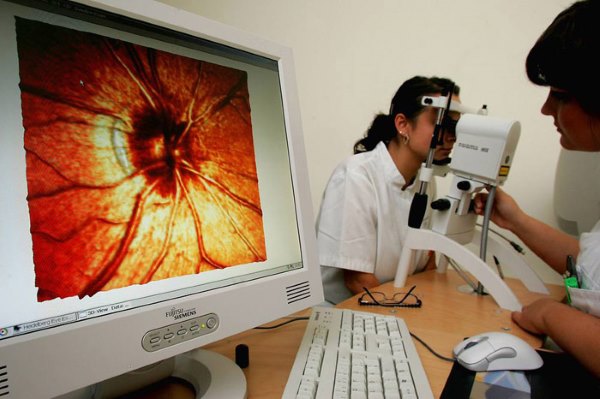
These examinations will help find the real reason why your head is dizzy and your eyes are dark. They will help the doctor choose the right treatment method.
Worth remembering! There are more than 80 reasons that cause headaches, dizziness and stuffy ears. It is simply impossible to independently determine which of them served as the starting point. Only a specialist should identify it through a thorough examination. Serious pathologies are possible, so self-diagnosis, much less self-medication, is strictly forbidden.
“throwing” into sweat due to problems with the nervous system
Dizziness may indicate the presence of diseases caused by a pathological process in the nervous system and blood flow of the head. In addition to dizziness, there are typical neurological symptoms such as:
- various fears;
- migraine (headache);
- insomnia (sleep disorder);
- the presence of hysterics and obsessive negative thoughts;
- balance disorders;
- nausea;
- general weakness, etc.
It is important to exclude life-threatening pathologies, including stroke, as well as chronic cerebrovascular accident. Stroke is an acute disturbance of cerebral circulation due to a rupture of the vessel wall (hemorrhagic) or the presence of a blood clot, narrowing of the lumen of the vessel (ischemic).
If you suddenly feel dizzy and break out in a cold sweat, as well as:
- there is a lack of coordination of movements;
- asymmetry, pallor of the face (there is a characteristic “distortion” in the left or right part);
- darkening or presence of “gnats” in the eyes;
- hands, limbs go numb,
Call an ambulance immediately and provide first aid for a stroke.
Banal dizziness, but serious problems
Hearing loss, usually unilateral, and prolonged dizziness signal Meniere's disease - inflammation and swelling of the inner ear. In this case, hospitalization is necessary.
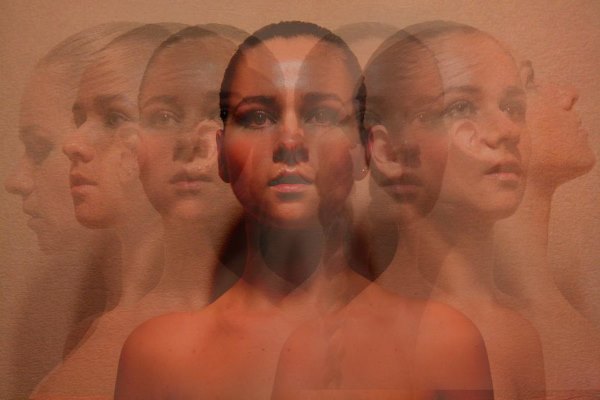
Severe dizziness, high blood pressure, weakness, double vision and darkening of the eyes are signs of a stroke.
Darkness in the eyes, weakness, dizziness, fainting - these signs of diabetes indicate a drop in glucose levels.
If you notice any of these symptoms, you should consult a doctor, especially if there is more than one sign. Diagnosis and treatment of the causes of dizziness, darkening of the eyes, and stuffy ears should only be carried out by a physician. Only after a thorough examination will he choose the correct treatment method.
Diagnosis of the disease
The determination of the disease is made on the basis of a study of the organs that cause concern in people. It is required to conduct general clinical tests of the circulatory and urinary systems, ECG, ultrasound diagnostics of heart disease and ultrasound.
Why do diagnostics?
A clinical study will allow timely identification and prevention of negative effects on the cardiovascular system.
To prevent disorders of the respiratory system, special tests are required. The digestive organs are examined through ultrasound of the abdominal cavity, less often - endoscopy of the mucous membrane of the duodenum and stomach. To timely stop the damage to the central nervous system, an EEG is performed.
If a patient has a stomach and duodenal ulcer, asthma and neurodermatitis, the diagnosis of vegetative-vascular dystonia is inevitable. The sympathicotonic type of disease occurs during diabetes mellitus or hypertension.
An additional sign of complications is meteorological sensitivity. The attacks are triggered by a feeling of fear and fear of death.
Treatment is carried out under the influence of drug therapy along with physical activity, massage, etc.
Prevention is based on an active lifestyle, sports activities, healthy sleep and a properly composed diet.
If you experience frequent dizziness and darkening of the eyes, it is recommended to consult a therapist. Based on the diagnosis, you can determine the need for help from a neurologist, cardiologist, otolaryngologist or endocrinologist.


